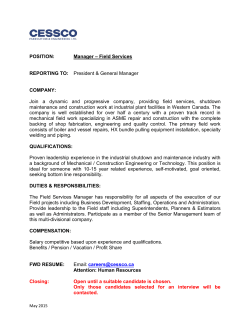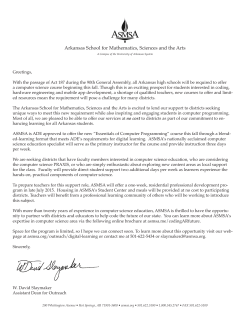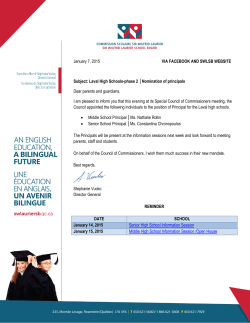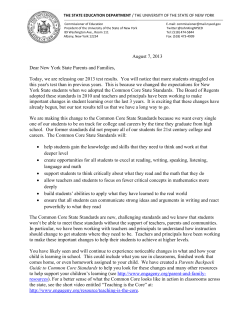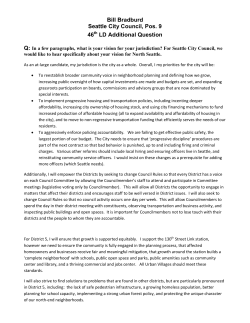
Letter Cuomo reform agenda
To: The Honorable Andrew M. Cuomo Governor of New York State From: Amy R. Paulin Member of Assembly Date: February 10, 2015 Re: Education Reform Budget Bill As we discussed during our telephone conversation, I met with a group of superintendents from Westchester County school districts to solicit their feedback on your proposed reform agenda. They were uniformly very pleased with a number of your specific proposals, including: • the extension of the probationary period for teachers and principals to five years; • the streamlining of the Section 3020(a) disciplinary process; • the provision requiring the Commissioner of Education to revoke the teaching certificate of a teacher convicted of a violent felony in which a child was a victim; and • the attempt to ensure that best practices in teacher and principal evaluation are implemented consistently across the state. The one area in which they believe the proposal needs some refinement relates to ways in which it deals with professional development and the Annual Professional Performance Review (“APPR”): Mandated professional development: • The superintendents did not understand the reasoning behind the reduction to 100 hours from 175 hours (a number chosen because it is supported by scientific evidence) of required professional development during each five-year period for holders of a professional certificate (i.e., a teacher who applied for certification on or after February 2, 2004 or a principal who applied for certification on or after September 2, 2007). Teachers and principals certified prior to those dates hold permanent certification and are not required to complete any professional development under current law or under the budget proposal. The superintendents would be comfortable with the proposed reduction from 175 to 100 hours if all teachers and principals, regardless of certification date, were required to complete 100 hours of professional development every five years. • It is critical that superintendents of schools, who know what professional development is required to accomplish district goals and understand the individual learning needs of district staff, have the final authority to approve or disapprove the professional development plans of district staff members. The State Education Department does not have the knowledge of local courses and providers necessary to determine which teacher education programs will satisfy the continuing education requirement. • Superintendents must be permitted, as they are under current law, to include as acceptable staff development not only formal teacher education programs but also collaborative work among groups of teachers, or even an entire district staff, on staff development days or at faculty meetings. • Because professional development activities move educators into higher salary ranges under most teacher contracts, superintendents need authority to approve those activities in order to ensure that mandated professional development hours result in benefits to their districts. It would also be helpful to add language making clear that, to the extent educators fill the continuing education requirement with formal courses, the holder of the certificate, not the employing school district, is responsible for the cost of those courses. Eligibility for tenure: • The requirement that a teacher receive five consecutive years of “effective” scores in order to be recommended for tenure could either extend the probationary period for as long as necessary for an educator to receive the five consecutive ratings of “effective” or lead him to abandon the effort to receive tenure. Superintendents, who understand local conditions, should be permitted to exercise their professional judgment to determine who should be recommended for tenure based on multiple measures of effectiveness, not just on APPR scores. • A score of “developing” should be viewed as a normal step in the career of an educator. The purpose of a “developing” score should be to allow newcomers to the profession—or to a course or grade level--to develop their professional knowledge and pedagogical skills in order to become the highly effective teachers and principals our students deserve. Use of standardized tests: • The superintendents with whom I met agree that it is useful to measure growth from one school year to the next in what children know and are able to do. They believe that objections to this subcomponent result primarily from the fact that it gives undue weight to the results of one test on one day in a child’s life. • A better-designed APPR, and one that I believe would likely receive support both from superintendents and from NYSUT, would look at three years of test results, on a rolling basis, in order to account for dramatic changes in class composition, changes in the courses or grades taught by a teacher, or similar variables that would make reliance on a single year’s test unreliable. Other measures of educator effectiveness: • Observations by an outside “expert” would provide the appearance of objectivity, but would not provide consistency given the wide range of evaluators that districts could choose. Further, an independent evaluator would not be able to evaluate fairly what goes on in an unfamiliar classroom or to provide useful follow-up to teachers. Observations by a building principal are followed by conversations about areas in which improvement is needed, the development and implementation of appropriate professional development plans, and subsequent formal and informal observations and monitoring of classroom performance. Any teacher can put on a good show for 30 minutes; the difficult work is in continuously improving the daily interaction between a teacher and specific students, each of whom brings to school a unique background and challenges. • • This subcomponent should include not just observations, but also other important measures of teacher effectiveness such as use of a class website, communication with parents, availability to students outside class hours, participation in professional development activities, collaboration with colleagues and leadership within a building. Only a principal will be in a position to observe the quality of those professional practices on a daily basis. Building principals, as the educational leaders of their buildings, should have the authority and professional responsibility to observe, evaluate, and work on professional development with the teachers under their supervision. Requiring observations by independent evaluators would impose an expensive and unfunded mandate on school districts. This subcomponent would require school districts to choose among three alternatives, two of which would require the expenditure of taxpayer dollars and one of which would require pulling administrators from their regular assignments. This additional expense is unfair to school districts that are already struggling to keep expenditures under the tax cap. The generally positive feedback that I received suggests that, with the kinds of adjustments indicated above, your reform agenda could receive both support from superintendents and less opposition from NYSUT.
© Copyright 2025



